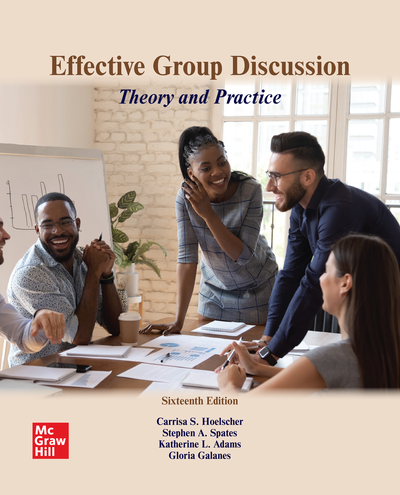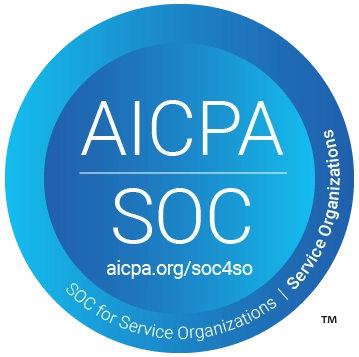Log In to My PreK-12 Platform


Effective Group Discussion: Theory and Practice, 16th Edition
Format Options:
-
Lowest Price!
eBook from $54.00 -
Print from $70.00 -
Connect from $107.07
McGraw Hill eBook
Textbook Rental (150 Days Access)
- Rent for a fraction of the printed textbook price
- Complete text bound in hardcover or softcover
Loose-Leaf Purchase
Unbound loose-leaf version of full text
Shipping Options
- Standard
- Next-day air
- 2nd-day air
Orders within the United States are shipped via FedEx or UPS Ground. For shipments to locations outside of the U.S., only standard shipping is available. All shipping options assume the product is available and that processing an order takes 24 to 48 hours prior to shipping.
Note: Connect can only be used if assigned by your instructor.
Connect (180 Days Access)
- Digital access to a comprehensive online learning platform
- Includes homework, study tools, eBook, and adaptive assignments
- Download the free ReadAnywhere app to access the eBook offline
Connect + Loose-Leaf
- Comprehensive online learning platform + unbound loose-leaf print text package
- Connect includes homework, study tools, eBook, and adaptive assignments
- Download the free ReadAnywhere app to access the eBook offline
Shipping Options
- Standard
- Next-day air
- 2nd-day air
Orders within the United States are shipped via FedEx or UPS Ground. For shipments to locations outside of the U.S., only standard shipping is available. All shipping options assume the product is available and that processing an order takes 24 to 48 hours prior to shipping.
* The estimated amount of time this product will be on the market is based on a number of factors, including faculty input to instructional design and the prior revision cycle and updates to academic research-which typically results in a revision cycle ranging from every two to four years for this product. Pricing subject to change at any time.
Instructor Information
Quick Actions (Only for Validated Instructor Accounts):
Now in its sixteenth edition, Effective Group Discussion combines the most recent research findings and practical tools students need to become productive group members. A variety of secondary groups are covered in the text: work groups, committees, task forces, self-directed work teams, and other small groups whose objectives include finding solutions to problems, producing goods, and creating policies.
CHAPTER 2: Human Communication Processes in the Small Group Context
CHAPTER 3: The Small Group as a System
CHAPTER 4: Diversity and the Effects of Culture
CHAPTER 5: The Members and Their Roles
CHAPTER 6: Communication and Group Culture: Tensions, Fantasy, Socialization, Norms, and Climate
CHAPTER 7: Leading Small Groups: Theoretical Perspectives
CHAPTER 8: Leading Small Groups: Practical Tips
CHAPTER 9: Problem Solving and Decision Making in Groups: Theoretical Perspectives
CHAPTER 10: Problem Solving and Decision Making in Groups: Practical Tips and Techniques
CHAPTER 11: Managing Conflict in the Small Group
CHAPTER 12: Tools for Assessing and Evaluating Groups
APPENDIX A: Preparing for Problem-Solving Discussions: Informational Resources for the Group
APPENDIX B: Making Public Presentations of the Group’s Output
Main Features
- LMS Integration
- Print/Loose-Leaf Book Add-On Availability
- Presentation Slides & Instructor Resources
- Question & Test Banks
- Adaptive Assignments
- Student Progress Reporting & Analytics
- Essay Prompts
- Polling
- Prebuilt Courses
- Interactive Exercises
- eBook Access (ReadAnywhere App)
- Remote Proctoring (Proctorio)
- Subject-Specific Tools
About the Author
Carrisa Hoelscher
Carrisa S. Hoelscher (Ph.D., University of Oklahoma) is an Associate Professor in the Department of Communication and Interim Associate Dean of the Graduate College at Missouri State University. She enjoys teaching, consulting, and training in the areas of communication competence, business and professional communication, group communication and teamwork, and leadership communication. As an organizational communication scholar, she researches and publishes on communicative tensions in the context of groups, organizations, and interorganizational collaborations. Most recently, her focus has been on the tensions between organizational/employee consent and embodied, culture-driven work ethic. Prior to joining the Graduate College at Missouri State, she served as the graduate program director for the Master of Arts in Communication program and as the assistant department head for the Department of Communication. In her associate dean role, she oversees graduate student recruitment, retention, and professional development.
Stephen Spates
Stephen A. Spates is an associate professor, in the Department of Communication, at Missouri State University. He has taught a variety of courses in organizational communication, workplace diversity, quantitative research methods, and health communication. Dr. Spates conducts grant funded research projects that look at bias and discrimination in the workplace. He has consulted with several corporate, and nonprofit organizations on communication topics. His Ph.D. is from The University of Tennessee.
Katherine Adams
Katherine L. Adams is an Emerita Professor and Chair of Communication at California State University, Fresno. She received her Ph.D. in Communication from the University of Utah under the direction of the late B. Aubrey Fisher; a renowned small group communication scholar. She taught in the areas of interpersonal communication, communication theory, and small group communication. She authored a textbook in interpersonal communication as well as an introduction to communication. She co-authored with Gloria Galanes, multiple editions of this group communication book as well as Communicating in Groups: Application and Skills. During her 38 year tenure in academia she chaired five academic departments and is a Past President and Distinguished Service Award winner of the Western States Communication Association.
Gloria Galanes
Gloria J. Galanes is professor emerita and former dean, College of Arts and Letters, Missouri State University. Her 22 years spent in university administration have fueled her long-standing interest in small groups. In addition to small group courses, she has taught organizational communication, leadership, communication and aging, intercultural communication, quantitative research methods, and applied communication research. Dr. Galanes was the founding director of the Citizenship and Service Learning program at Missouri State. Her classes have investigated such topics as the needs of youth in the community, the needs of older adults, and the perceptions of Springfield Public Schools on behalf of numerous community organizations in Springfield. Her research into community issues has continued since her retirement. She is the co-author of two small group communication textbooks and co-edited a text on social constructionism. Her Ph.D. is from The Ohio State University.
Accessibility
Creating accessible products is a priority for McGraw Hill. We make accessibility and adhering to WCAG AA guidelines a part of our day-to-day development efforts and product roadmaps.
For more information, visit our accessibility page, or contact us at accessibility@mheducation.com
Affordability
Reduce course material costs for your students while still providing full access to everything they need to be successful. It isn't too good to be true - it's Inclusive Access.
Need support? We're here to help - Get real-world support and resources every step of the way.

